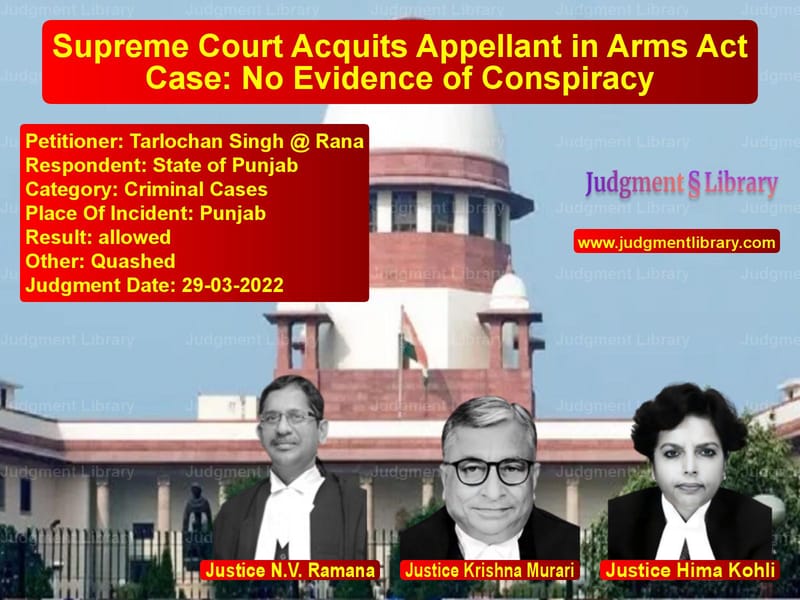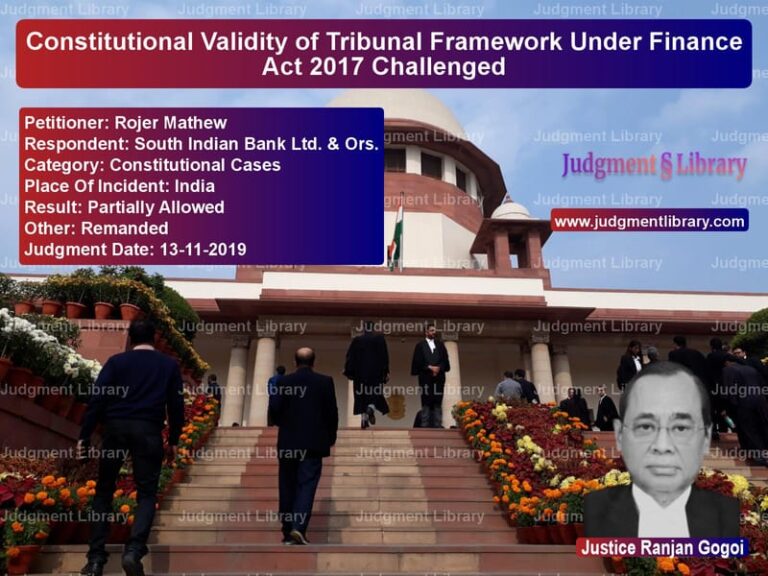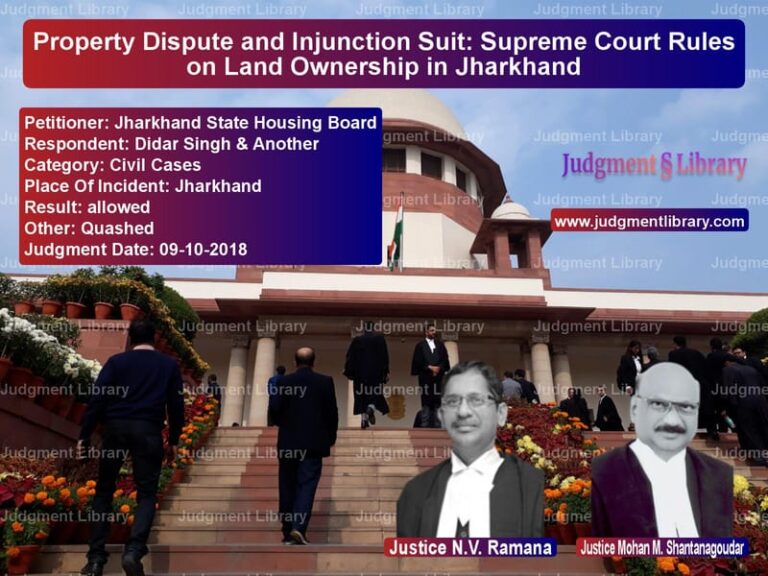Supreme Court Acquits Appellant in Arms Act Case: No Evidence of Conspiracy
The case of Tarlochan Singh @ Rana vs. State of Punjab is a significant ruling by the Supreme Court concerning wrongful conviction under the Arms Act and conspiracy charges. The judgment clarifies that mere ownership of a firearm used in a crime does not automatically implicate the owner in the offense.
This appeal was directed against the judgment of the Punjab & Haryana High Court, which had set aside the conviction under Section 120-B IPC (criminal conspiracy) but upheld the conviction under Sections 29 and 30 of the Arms Act. The Supreme Court, upon review, acquitted the appellant of all charges, finding that there was no evidence of willful participation in the crime.
Background of the Case
The prosecution’s case stemmed from the murder of Gurdeep Singh on August 10, 2007. The investigation revealed that the accused, Gurpreet Singh @ Titu, had used a double-barrel 12-bore rifle to commit the murder. This firearm was legally registered under the name of the appellant, Tarlochan Singh.
The prosecution alleged that:
- The accused had a premeditated plan to kill Gurdeep Singh.
- The firearm used was owned by the appellant.
- The appellant had willingly provided the weapon to the accused.
Based on these allegations, the appellant was convicted by the trial court under Sections 120-B IPC, 29, and 30 of the Arms Act.
Proceedings Before the High Court
On appeal, the High Court reviewed the evidence and found that the prosecution had not established a conspiracy involving the appellant. Thus, it set aside the conviction under Section 120-B IPC. However, it upheld the conviction under Sections 29 and 30 of the Arms Act, ruling that the appellant failed to ensure the firearm’s safe custody.
Arguments Presented by the Appellant
The appellant, through his counsel, contended:
- The crime had been committed without his knowledge.
- The firearm was taken illegally from a farmhouse co-owned by him and the accused.
- He had never willingly handed over the firearm.
- The prosecution had not produced any evidence proving his involvement in a conspiracy.
Arguments Presented by the Respondent
The State of Punjab, in its counter-arguments, stated:
- The appellant was the legal owner of the firearm used in the crime.
- As a license holder, he had a duty to ensure the weapon was not misused.
- No complaint was filed by the appellant regarding the firearm’s theft, indicating negligence.
Supreme Court’s Observations
After reviewing the arguments and evidence, the Supreme Court made the following key observations:
- There was no evidence that the appellant had willingly handed over the firearm.
- The accused, Gurpreet Singh, had taken the weapon without the appellant’s knowledge.
- The farmhouse where the weapon was stored was jointly owned by the appellant and the accused.
- The appellant had not violated any provisions of the Arms Act.
Legal Precedents Considered
The Supreme Court referred to various legal precedents concerning wrongful conviction under the Arms Act:
- Kartarey v. State of U.P. (1976): Emphasized that mere ownership of a weapon does not establish criminal liability.
- State of Haryana v. Bhagirath (1999): Held that criminal liability must be proven beyond reasonable doubt.
- Gurcharan Singh v. State of Punjab (2017): Clarified that intent and knowledge are essential for conviction under the Arms Act.
Supreme Court’s Verdict
Based on its analysis, the Supreme Court ruled:
- The appellant had no role in the crime.
- There was no proof that he had willingly given his firearm to the accused.
- The prosecution failed to establish negligence or conspiracy.
Accordingly, the Supreme Court:
- Allowed the appeal.
- Set aside the High Court’s order.
- Acquitted the appellant of all charges.
Impact of the Judgment
This ruling has significant implications:
- It reinforces the principle that ownership of a weapon does not automatically establish liability.
- It emphasizes the need for clear evidence before convicting an individual under the Arms Act.
- It provides a safeguard against wrongful prosecution of licensed firearm owners.
The judgment serves as a precedent ensuring that individuals are not held guilty merely based on circumstantial evidence.
Petitioner Name: Tarlochan Singh @ Rana.Respondent Name: State of Punjab.Judgment By: Justice N.V. Ramana, Justice Krishna Murari, Justice Hima Kohli.Place Of Incident: Punjab.Judgment Date: 29-03-2022.
Don’t miss out on the full details! Download the complete judgment in PDF format below and gain valuable insights instantly!
Download Judgment: tarlochan-singh-@-ra-vs-state-of-punjab-supreme-court-of-india-judgment-dated-29-03-2022.pdf
Directly Download Judgment: Directly download this Judgment
See all petitions in Bail and Anticipatory Bail
See all petitions in Judgment by N.V. Ramana
See all petitions in Judgment by Krishna Murari
See all petitions in Judgment by Hima Kohli
See all petitions in allowed
See all petitions in Quashed
See all petitions in supreme court of India judgments March 2022
See all petitions in 2022 judgments
See all posts in Criminal Cases Category
See all allowed petitions in Criminal Cases Category
See all Dismissed petitions in Criminal Cases Category
See all partially allowed petitions in Criminal Cases Category







